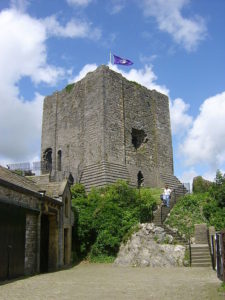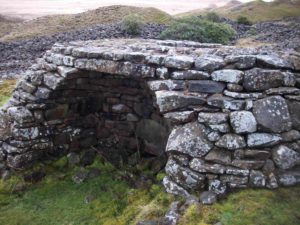Peter del Strother’s excellent talk to a super audience of the Friends and guests was a fascinating insight into little known facts (to some of us anyway) of Clitheroe.
Did you know that?
There’s a finial in the rose garden of Clitheroe Castle from the Houses of Parliament that was burnt down in 1834…
That in the 1800’s a basic map of Lancashire showed a dominant Clitheroe but no Manchester!
In 1825 Clitheroe had 2 Members of Parliament, Manchester none, neither did they have a Mayor.

Clitheroe Castle. Credit: Small town hero. Public domain
That at election times, riots included the use of knuckle dusters (Clitheroe? the bastion of the Ribble Valley!). The population was more settled when secret balloting was instigated.

History of Clitheroe talk. From left Beverley Warne. G Wray, Peter del Strother, Jean Hardman. Credit D. Beaumont
That unusually the tenants in houses on the burgage plots leading from the main street were allowed to have voting rights and to pass their property on to their children or sell the rights to the property.
The earth beneath the feet of the people of Clitheroe held limestone that was the foundation of Clitheroe’s economy and at one time provided many jobs and livelihoods for a great many in the population and lime /cement is still in production today.
Clitheroe is the nearest northern geographical point from Manchester where limestone can be found.
That at one time there were between 500 -1,000 pack horses per day carrying lime from Clitheroe.
In the 17th century there was a great risk of fire in homes as many people had lime kilns in their back gardens (or burgages) due to embers being carried around the village.

Shedden Pack Horse Route. Attribution: C. Rousseau Jones
Fields that have been limed show as vibrant green compared to rough brackenish moorland.
That in the Parish churchyard a gravestone records how a good man, William Southworth, a father of six, was “struck down in a moment of unforgivable passion”.
Peter also showed clips of men breaking up and handling lime, ‘elf and safety there wasn’t. Their slender frames and the sheer hard work of their every day working lives was a poignant reminder of why the Trade Union movement took hold in the north.
Banner Image: lime_kiln. Attribution: Alexander P. Kapp